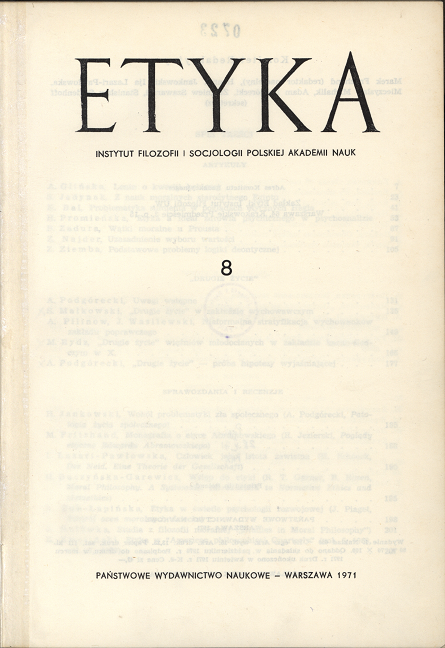„Drugie życie” - uwagi wstępne
Abstract
Investigations on what is called „hidden life” were carried out in 1969-1970 by the Research Group for Social Norms and Pathology of Social Life in the Sociological Institute of Warsaw University. In the articles published in this volume in Polish the authors try to sum up the sociological aspects of the investigations. The investigations do not claim to describe in a full and adequate way all phenomena that are generally called „hidden life”. The following was to be achieved: the completion of the present pedagogical and psychological knowledge with respect to the sociological aspects of the „hidden life”, comparative studies of various institutions (educational, penitentiary, criminal) with a view to formulate a diagnosis about the intensity of „hidden life” in different systems of isolation, the explanation of the fundamental manifestations of the described phenomena, and, at last, the preparation of sufficient and rational grounds for a considerable limitation of the „hidden life” or for its elimination. Apart from aspects of social pedagogy, the discussed investigations have also had purely theoretical aspects. The phenomena of the „hidden life” are in principle an unknown territory in such domains of knowledge as sociology, pedagogy, and psychology. Perhaps the results obtained will permit to describe more fully the pathological and non-pathological events connected with the „hidden life” and to understand it better than hitherto. This may also be of some importance for ethics. It should be added that there are many analyses of the functioning of moral norms in different environments, the character of which is not far from normal. But there are few analyses of moral life in exceptional situations, as regards social groups; among them also in situations contained in the term „hidden life”.Downloads
Published
Issue
Section
License
Works published in ETYKA are available under the Creative Commons Attribution No Derivatives 4.0 International Licence (CC BY-ND), which entails acknowledgement of authorship without derivative works. Under this licence, Authors keep their copyrights and agree that their works can be used again legally for any purpose, including commercial ones, except for the creation of derivative works, without the need to obtain previous consent of the Author or publisher. The articles can be downloaded, printed, copied and disseminated; under the condition that the authorship is indicated accordingly, together with the place of original publication. The Authors preserve their copyrights to the above-mentioned works without any limitation whatsoever.



